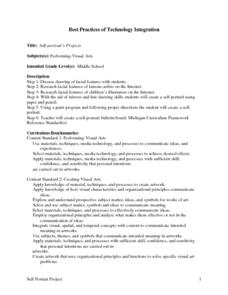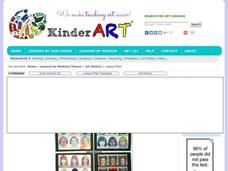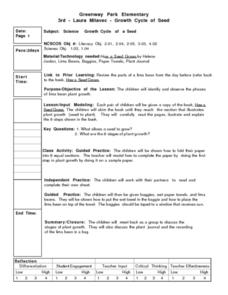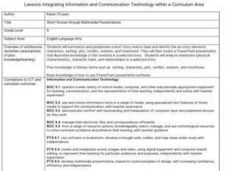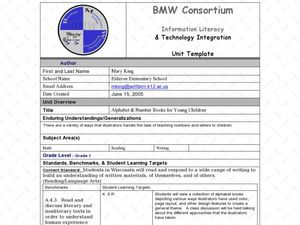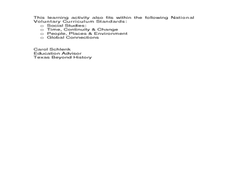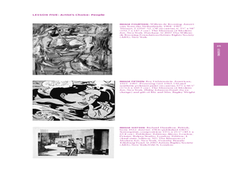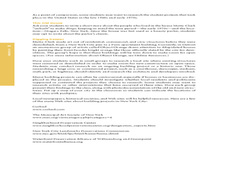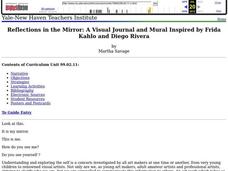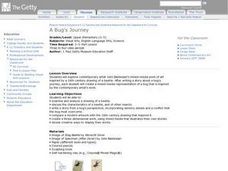Curated OER
Friends, Romans, Countrymen...
Students research an important person or place from Ancient Roame and communicate their findings in a report that includes a map and illustration. Students may publish their reports online.
Curated OER
My First Number Book
Pupils produce a book that includes a page for numbers 0-10. They write the numeral, the word for that numeral and place the correct number of stickers to represent the numeral. The cover includes a title, student's name and an...
Curated OER
Self-portrait Projects
Teacher discusses drawing of facial features with middle schoolers. They then research facial features of famous artists and children's illustrators on the Internet. Students then will create a self-portrait using paper and pencil.
Curated OER
Warhol "Pop Art" Portraits
Students create self-portraits in "Pop-Art" style using repetition, bright colors, and their knowledge of Andy Warhol and his artwork in this 4th through 6th grade Art lesson. Included with the lesson is a short vocabulary list and...
Curated OER
Personal Adventure Stories
Students examine the characteristics of an adventure story. Students write an adventure story of their own based on a true personal experience. After drafting their story, students use a word processor to write, edit, and revise their work.
Curated OER
The Lima Bean
Third graders investigate the life cycle of a seed. The parts of a lima bean are presented as part of a review. They identify the parts of the seed and state different stages as seen in observation. Students also use an illustration to...
Curated OER
Arbor Day
First graders study the importance of trees to our environment. they make their own version of the story by completing the following sentence and then completing an illustration for their writing. "A tree can be ______."
Curated OER
Short Stories Through Multimedia Presentations
Ninth graders summarize and paraphrase a short story read in class. They identify the six story elements of character, setting, plot, conflict, solution, and tone/mood. Students create a PowePoint presentation that illustrates the...
Curated OER
Thinking Syntactically: Using non-print text to faciliate generation of syntax and analysis of tone
Students write with a command of the stylistic aspects of composition. They respond to non-print text. Students demonstrate working knowledge of syntactical choices. They construct sentences using descriptive language. Students analyze...
Curated OER
Application of Differentiation: Optimization
In this optimization worksheet, students complete a table identifying the characteristics of a function and it's derivative and provide an illustration of each type of function. Afterward, they use the first derivative test for finding...
Curated OER
A Teeny Alphabet Book
In this tiny alphabet book instructional activity, students cut out, color, assemble and staple a tiny alphabet book with uppercase letters A-F. Students look for examples in each picture that begin with each alphabet letter illustrated.
Curated OER
Alphabet & Number Books for Young Children
First graders create either an alphabet or number book using Kid Pix software. In this alphabet and/or number unit, 1st graders design a themed alphabet and/or number book using the Kid Pix software over the course of three weeks....
Curated OER
Ft. St. Louis: A Do-It-Yourself History
Seventh graders explore Fort St. Louis. In this Texas history lesson, 7th graders research Internet and print sources regarding the history of fort and the settlement. Students use their research findings to create illustrated books...
Curated OER
Art and Politics
Students analyze the work of three artists whose art work illustrates important political and social events. In this art analysis lesson, students analyze the art of Jasper Johns, Charles Moore, and Andy Warhol. Students complete image...
Curated OER
Public Interventions
Students analyze the work of two artists who made interventions in public spaces. In this art analysis lesson, students investigate ephemeral and site specific art. Students complete image based discussion and related projects.
Curated OER
Alternate Histories
Students create a mixed media collage. In this visual arts lesson plan, students look at the work of Jane Ash Poitras. They create their own collage that shows their personal and collective history and experiences.
Curated OER
Poetry III--Haiku Writing
Students create and solve haiku riddles. For this haiku writing lesson, students work in groups to match a haiku to an illustration. Students write haiku and assess themselves and their peers.
Curated OER
Blue Planet: Open Ocean
Students research facts about animal species. In this ocean activity students view a video, prepare illustrated cards and create a food-web display.
Curated OER
Reflections in the Mirror A Visual Journal and Mural Inspired by Frida Kahlo and Diego Rivera
Students examine and analyze works of art by Frida Kahlo and Diego Rivera. They create journals that follow the form and content of Kahlo's diary, and murals in the spirit of Rivera.
Curated OER
Pink Floyd and the Carpe Diem Theme
Students listen to Pink Floyd's "Time" in order to apply the theme of carpe diem to other works of literature and to their own life.
Curated OER
A Picture is Worth a Thousand Words
Students view selected works of Keith Haring, discuss artist's life, brainstorm words to illustrate, emphasizing words that have emotional impact, practice drawing figures in style of Keith Haring, and paint figure(s) and background,...
Curated OER
A Bug's Journey
Students examine the artwork of John Baldessari that was inspired by a 16th century drawing of a beetle. They analyze a drawing of a beetle, discuss the insect's characteristics, and write a story from the perspective of a bug. Also,...
Curated OER
Author Study
Students work collaboratively to create PowerPoint presentations on an author of their choice. This lesson is written for a first and third grade joint project with students pairing up across grade levels.
Curated OER
The Art of Me
Students study about symbols and reflect on the important things in their lives. They choose symbols to represent some of the things that are most important to them and follow directions to create their works of art.




